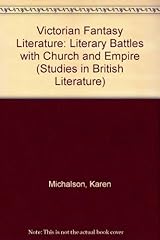Examines the non-literary and non-aesthetic reasons underlying the bias in favor of realism in the formation of the traditional literary canon of nineteenth-century British fiction. Examines the role of the Anglican Church as well as that of Non-Conformist or Dissenting evangelical sects in the educational institutions of the first half of the century, and the function of the academic study of English literature in British imperialist ideology in the latter part of the century. Demonstrates that both Church and Empire needed a canon of realism to promote their own brand of conservative ideology. Victorian fantasy writers often targeted Church doctrine or imperial dogma for especially satirical treatment, thus insuring their own exclusion from the universities which were run by the Church and operated to supply patriotic administrators to the Empire.
Focuses in detail on the lives and historical situations of five Victorian fantasy writers: John Ruskin, George MacDonald, Charles Kingsley, Henry Rider Haggard, and Rudyard Kipling.
Available from
Alibris The Edwin Mellen Press Waterstones
Reviews
For all of you who’ve ever wondered why fantasy and science fiction are treated like red-headed stepchildren by the likes of English faculty, book store managers, and literary critics, Karen Michalson’s immensely accessible Victorian Fantasy Literature: Literary Battles with Church and Empire offers some excellent explanations regarding this continuing attitude. . . . The chapter “Fantasy and Victorian Education” should be required reading . . . . Michalson’s engaging tone and the atypical, eccentric natures of her subjects make this tome anything but dry kindling. The combination of historical and biographical information to create contexts for the mental workings of each writer are presented in a tone meant to engage rather than intimidate the reader. Clearly Michalson enjoys her subject, and she wants her audience to share that enjoyment — a rare quality indeed for an academic. . . . There must be more Karen Michalsons. There must.”
— Eva Wojcik-Obert, Fantastica Daily Full review archived here.
“Her material is well-researched and cogently presented, and I find her willingness to discuss texts in terms of the cultural matrices in which they developed not only logical but admirable. . . . definitely an important look not only at major fantasy works of the period, but also at why realistic literature did make it into the canon and fantasy literature did not.”
— C. W. Sullivan III, Science Fiction Research Association Review
“. . . a fascinating exploration of the origins of Victorian attitudes toward the fantastic, and how those attitudes were perpetuated through the educational system and the development of a literary establishment. . . . she’s also provided a valuable missing chapter in the history of how the ideologies of realism have systematically brutalized the opposition – and how they continue to do so today. In the last few years, a number of sf writers and fans have been rediscovering some of these writers – Kipling in particular – and they may want to check out Michalson’s arguments. They’ll find that although these arguments are complex, her style is refreshingly straightforward and free of critical cant.”
— Gary K. Wolfe, Locus
“Karen Michalson’s book is unusually free from jargon and has a wide-ranging approach to its subject matter. It combines an examination of the reasons for the exclusion of fantasy fiction from the accepted canon with stimulating studies of five fantasy writers . . . . Her careful recording of her numerous sources of reference is invaluable . . . Michalson’s study of John Ruskin’s King of the Golden River is fascinating and important . . . . The Water-Babies is an important influence upon a number of MacDonald’s stories from “The Gold Key” onwards, and Michalson’s study of the book is one of the best so far published.”
— North Wind: A Journal of George MacDonald Studies

